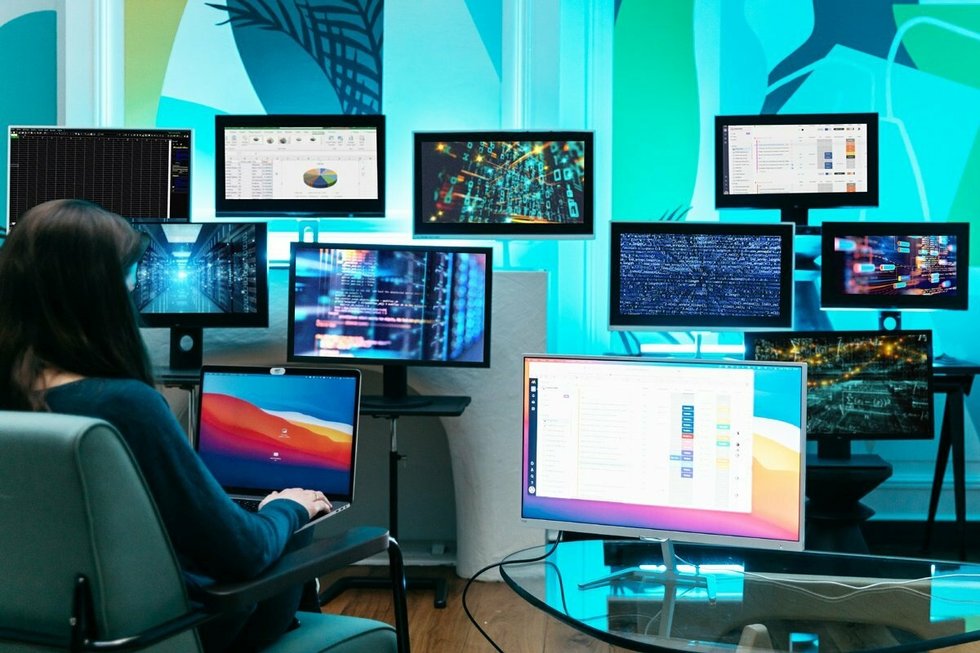Tired of tech? My 8 low-tech ideas to improve how you work
Feb 21, 2022
6 mins



Photographe chez Welcome to the Jungle
I don’t know if it’s because I’m getting older or if it’s an effect of the two years of the pandemic, but I’m becoming increasingly weary of all things tech-related, including tech talk. I used to be a tech-optimist, convinced that some of the world’s big problems (and my own) would be solved with new tools. Today, I feel that at best tech wastes a lot of my time and bores me deeply, and at worst it turns me into a nasty, deadly zombie.
Over time, I’ve become a later and later adopter of new tech. “Let others test it and if it’s still around in six months, it might be worth it,” is what I say now. Those of us who get on board later than others (late adopters) are considered old-fashioned. But today, I take some pride in being a skeptic. Remember Clubhouse, the audio chat application that appeared in 2020 and was supposed to become the social network of the future? Well, we don’t talk about it much anymore. So who’s old-fashioned? The skeptical one or the one who invested hundreds of hours to gain followers on an app that is barely used one year later?
The two years of the pandemic probably amplified my skepticism. I can barely handle wearing a surgical mask for more than an hour. So if I’m told that I’ll have to put on a virtual reality helmet to go work in the metaverse, you can count me out. I simply don’t care about NFTs (Non-Fungible Tokens). I yawn and roll my eyes when I hear yet another tech-enthusiast explain that blockchain will change the world and the future of work.
I’m not going to become a hermit and give up all modern comforts, but, more and more, I long for slowness and disconnection. I fantasize about the ability to read and concentrate that I had before the internet came along. I dream of a homely life where my brain isn’t burdened with 30 notifications at once, where I can leave my computer for two days without the risk of a mountain of unanswered emails and overdue messages.
Around me, I see more and more people who share these aspirations and develop low-tech or slow-tech techniques to preserve their mental and physical health. They turn off their smartphone notifications, devise detox rituals, learn to meditate, and sometimes intentionally use more minimalist tools to be able to focus better. Like them, I’m increasingly turning to “old-fashioned” methods to get more done. Here are eight low-tech ideas that might inspire you too.
1. Pen and paper
Some environmentalists will undoubtedly scream about the potential to create piles of waste, but this is not about using up lots of paper! Working with pen and paper for just a few hours is a great tool for creativity. Using our fine motor skills facilitates concentration and a state of flow. Freed from digital distractions, we create space to concentrate, which helps good ideas to flow. With pen and paper, we step back to think outside the box. Every project should include a first creative and concentrated phase that is decidedly low-tech to help us to get our heads above water. Furthermore, writing by hand is a little sensory delight that we should all relearn. That’s why in the cult book The Artist’s Way, Julia Cameron recommends following the “morning pages” ritual: spend 45 minutes every morning writing three pages, jotting down everything that comes to mind. Soon enough, it will free your brain from all the noise.
2. Office hours
What could be more old-fashioned than office hours, you might ask? When you can work when you want, where you want, why inflict such archaic constraints on yourself? Whether you are a “morning person” or a”night owl,” it can be hard to fight your biological cycle. Even if choosing our own hours is a good thing, not everyone can do it: some people have outdated managerial policies, and some parents have to answer to alarm clocks and school bells. But let’s not forget that “flexible” work has gradually turned into a monster that eats everything up. When there is no schedule, the greatest risk is that you will end up working all the time. Burnouts are multiplying for the simple reason that many of us are unable to discipline ourselves. For me, I realized that I was more productive when I organized my workday according to “office hours” and “clocked out” regularly even though I could still work more. It’s good to stop. That way, it’s easier to get back to it the next day.
3. A landline
Many of us don’t even have one anymore. The landline telephone reeks of the 20th century when you had to monopolize the family phone to spend hours talking with your friends. Today, your good old landline is probably hidden away somewhere. But it’s still a good alternative! It usually has much better sound quality than the apps we use today that repeatedly cut in and out. Additionally, when you don’t have the option of looking at a screen when you are speaking or listening, you can better concentrate on the conversation. The nostalgia of the pre-internet era adds a little old-fashioned charm to the exchange. Ironically, it can make you feel closer to the person you’re speaking to. In general, the use of single-purpose devices is relaxing. If there is nothing else to do but talk, we do not delude ourselves into believing that we are capable of multitasking. Today, specialists are almost unanimous on this point: multi-tasking does not work!
4. Phone-free meetings
Imagine you’re sitting in a boring meeting you don’t want to be at. Now imagine you don’t have your phone with you to relieve your boredom. There’s nothing worse, right? Well no, what’s worse is being in a boring meeting while mindlessly answering emails and scrolling on LinkedIn like a zombie. If you’re neither paying attention to what’s going on in the meeting nor the tasks you’re doing on the sly on your phone, you can get mentally exhausted and feel like time is dragging on. It’s not uncommon now to see groups instituting smartphone-free habits. Like those mobsters who lay down their weapons at the entrance of the building before negotiating a ceasefire with their rivals, we should make a phone truce so we can dedicate ourselves fully to those who are in the same room as us. The physical presence of other individuals is becoming rare enough to be valued. But for this to work, meetings should not be too long or too frequent!
5. Walking meetings
Walking and talking is not a new idea! But when dealing with “Zoom tunnels” and over connection, I have spent entire days with my butt glued to my office chair! I’ve put on a few pounds and my limp body is getting more and more tired. I’m not alone: the sedentary lifestyle adopted during the pandemic is taking its toll on our health. At the height of the crisis, everyone was eager to get outside, walking and talking, both for work and leisure. Walking meetings have plenty of advantages: not only are they healthy, but they also promote creativity. Walking and talking reduces stress and stimulates conversations. Moreover, it is a flexible meeting format: you can also walk and talk on the phone. (Of course, this isn’t easy to do with a landline phone, but I never said that you should use only your landline.)
6. Books and printed files
When I was younger I used to make fun of those lawyers and politicians who had their secretaries print their emails and files so they could read them at home in the evening. No doubt some of them could have learned to live in the digital age. But now I wonder if maybe this wasn’t so silly after all, as it is easier to concentrate on what you’re reading on paper than it is on a screen. No, I’m not going to start printing my emails, don’t push it. But I have started reading more paper books. As a result, when I put my connected devices aside, I sometimes manage to read several pages in a row without checking something on Google.
7. Book club
Not only is reading books a low-tech idea that improves my own life, but it’s also a good idea to share. It’s even a great social activity! There’s nothing like a book club to bring people together, spark exciting conversations, and facilitate the exchange of ideas with passion. Even in the corporate world, a book club is still a great idea. It can be used for team bonding, employee training, employer branding, and so on.
8. Think about what you want to say
This idea may be wishful thinking, but I’m committed to it. At work, we inflict a frantic pace on ourselves. We speak and write quickly, but don’t leave ourselves time to think things through. As a result, we produce too many speeches, comments, posts, emails, and words. We’re all guilty of contributing to this cognition crisis that plagues us: our “old” brains do not know how to process all the information and distractions out there. To hit the brakes, we should adopt a self-imposed discipline of slowness: wait 24 hours before answering most emails (sometimes you can even wait more than a day which is even better); compose your messages carefully so as not to hurt others; refrain from commenting on every online post; react only after a careful reading of a text or file. It’s always wise to think before you speak. It’s even more important to think before you write. Doing so can make life better for everyone.
Translated by Kim Cunningham
Follow Welcome to the Jungle on Facebook on LinkedIn and on Instagram and subscribe to our newsletter to get our latest articles every day!

More inspiration: Laetitia Vitaud
Future of work author and speaker

Age does matter, at work and in the White House
What we've learned from the 2024 presidential elections about aging at work.
Sep 09, 2024

Can companies avoid a brain drain as retirements surge?
Bye bye, Baby Boomers. Hello, knowledge exodus?
Jun 12, 2024

Workplace anxiety: Navigating the future of work in an anxious world
Anxiety has taken center stage in our modern world. How is it shaping the future of work? And most of all, what can we do about it?
May 20, 2024

Why recruiters should hire more ex-freelancers
While freelance and salaried work can seem worlds apart, they may have more in common than you think.
May 02, 2024

How women over 50 are reinventing their careers and the future of work
Women in their 20s struggle to be taken seriously, while middle-aged women battle discrimination... So how are women over 50 reinventing the wheel?
Apr 02, 2024
The newsletter that does the job
Want to keep up with the latest articles? Twice a week you can receive stories, jobs, and tips in your inbox.

Looking for your next job?
Over 200,000 people have found a job with Welcome to the Jungle.
Explore jobs